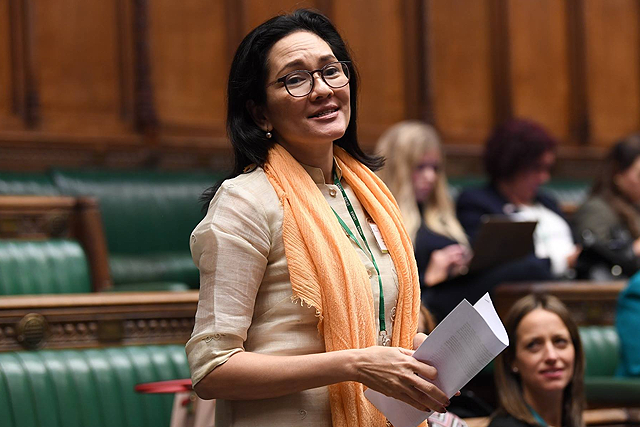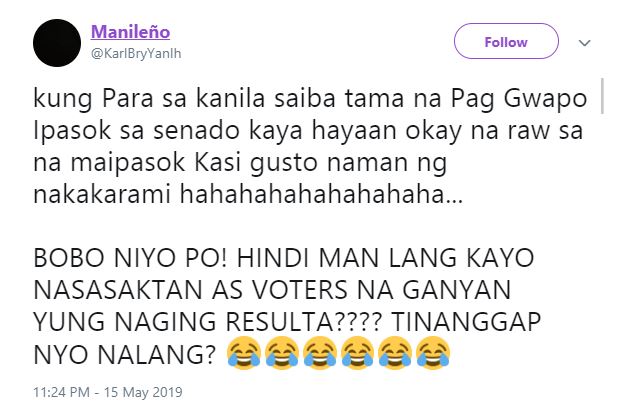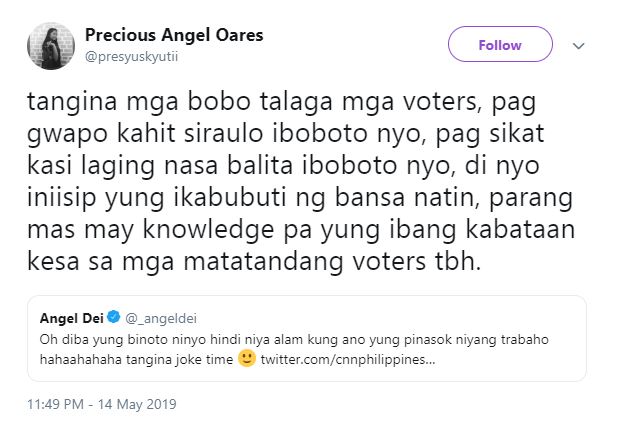
Sen. Risa Hontiveros appealed for Filipinos to stop vote shaming each other following the emergence of social media posts condemning voters as Comelec releases the unofficial tally of the senatorial race.
The Akbayan senator in her Facebook and Twitter accounts asked for Filipinos to refrain from calling each other “bobo” (stupid) and “tanga” (idiot) and instead, get to know the reasons why certain senatorial aspirants made it on the top 12.
Let’s put an end to the vote-shaming. Tama na ang tawagang tanga at bobo. Ang hamon sa atin ngayon ay alamin ang kadahilanan sa likod ng pagpili ng bawat isa.
We must humbly listen & create & nurture more spaces for democratic dialogue & conversations.
— risa hontiveros (@risahontiveros) May 16, 2019
In her Facebook post, she said that each voter has his own reasons for choosing a certain electoral candidate.
“May dahilan ang pagpili ng kandidato ng mga mamamayan. Ang hamon sa atin ngayon ay alamin ang mga kadahilanang ito. We should listen with humility,” Hontiveros wrote.
Her appeal came after some Filipinos expressed their dismay and anger at the partial unofficial and official counts of the Comelec on the senatorial race through social media.



Most administration-backed senatorial aspirants dominated the “Magic 12” since the preliminary results were disclosed on the night of the voting day.
Mock senatorial surveys conducted in higher educational institutions revealed that college students preferred opposition candidates than those endorsed by PDP-Laban or Hugpong ng Pagbabago.
Twitter Philippines reported that Otso Diretso bets were among the most talked about candidates on the platform that is popular among the youth.
Don’t vote shame
Presidential Communications Secretary Martin Andanar appealed to the public to stop from calling their fellow voters “bobotante” after some senatorial bets failed to enter the “Magic 12.”
“We find it unfortunate that some quarters who could not accept the crushing defeat of their senatorial candidates would resort to ad hominem arguments, such as vote shaming, to stress their points,” he said.

“Questioning or putting doubt on the ‘intelligence’ of the Classes D and E voters, derisively referred to as ‘bobotantes,’ is simply wrong,” Andanar added.
Experts believe that impoverished and uneducated voters should not be blamed for the turnout of the midterm elections, based on the unofficial tally.
Sociologist Jayeel Cornelio said that putting the blame on such voters is “problematic.”
“‘Pag naririrnig natin ‘yung bobotante na accusation, parang it’s the woke middle class accusing the bobo, parang low-income families, low-income voters,” he said in an interview.
“Pero sino ba talaga ‘yun? Bakit natin nasasabi na bobo sila? Just because they voted for a different set of candidates? Even the poor have their own rationalities and justification in choosing their candidates… maling mali ‘yung bobotante,” Cornelio continued.
For political analyst Dindo Manhit, people who blame these kinds of voters should not resort to such actions since the results reflect the “needs” and aspirations of Filipinos, no matter the outcome.
“It’s a reflection of what their needs are and what they hope the government can do for them,” he said.
“At the end of the day, election is a democracy… You should not blame them because these are people who made their choices because some candidates address their needs, instead of other candidates who might intellectualize and force them to accept their belief,” Manhit added.









